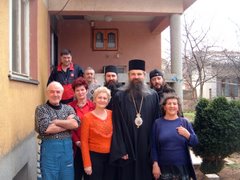President Tadic's Address At the UN
September 24, 2006
KiM Info Newsletter 24-09-06
Statement by H.E. Mr. Boris Tadic, President of the Republic of Serbia at the General Assembly of the United Nations
The autonomy offered by Serbia to Kosovo Albanians is broader than any currently enjoyed by any region or a federal unit in Europe. In our view, that is a sustainable, stable and long-standing solution that would open a new chapter in the long and difficult history of Serb-Albanian relations. Among other things, it would enable Kosovo to have direct access to international financial institutions, necessary for its economic recovery and development which are in the interest of both Serbia and the region as a whole.
President Tadic speaking at the UN General Assembly, Sep 21, 2006
New York, 21 September 2006
Madam President, Excellencies, Ladies and Gentlemen, Dear Friends,
First of all, I would like to sincerely thank His Excellency Mr. Kofi Annan, Secretary-General of the United Nations for all the efforts he made during his very successful mandate during the time of enormous challenges facing our civilization. I would particularly like to single out his exceptional understanding of the problems that Southeastern Europe has faced and is still facing.Allow me also to congratulate the new President of the General Assembly, Her Excellency Madam Sheikha Haya Rashed Al Khaifa for her election.At the same time, I warmly welcome the accession of Montenegro to the UN membership, as a new Member State.I am addressing you today, ladies and gentlemen, as the President of the Republic of Serbia, an independent and democratic State in Southeastern Europe, in the Balkans.I would like to assure you that Serbia seeks to make a significant contribution to this part of the world - in terms of fast democratization and respect for human rights, economic development, the security of the entire Balkans and the stability of Southeastern Europe. Instead of being a place where problems are created, Serbia and the Balkans must become a place where problems are resolved in a peaceful manner.Serbia is simultaneously both a new and an old State - new, because its flag is flying for the first time in the front of this building and old, because already in 1835 its Constitution guaranteed freedom to any man setting a foot on its soil; new, because it is being created against the backdrop of specific challenges of the 21st century; old, because it is created in accordance with the very principles it helped to establish and embody in the Charter of the United Nations in 1945.Today, Serbia is an active member of the United Nations. We believe that the decisions made under its auspices have to form the basis of stability and prosperity for all States and peoples in Southeastern Europe.
Madam President, Excellencies,Serbia believes in shared and prosperous future of the Balkans. It is important to stress that none of the current problems in the Balkans can be viewed or resolved in isolation without taking into account our common history and a vision of our shared future. Hence, in dealing with any problem in the Balkans it is necessary to hear and give weight to the opinions of all countries in the region.I trust that a better future for our part of the world is based upon three major principles:- democracy, as a guarantor of human freedom and basis of economic progress;- security of each State as a precondition for the security of the entire Balkans;- regional stability as a vital factor of global peace and prosperity.All the challenges we face should be tackled in accordance with the above principles. In that spirit, Serbia is sincerely committed to the territorial integrity of all Balkan States and the preservation of their existing borders. In the same vein, the' integrity of Bosnia and Herzegovina, based on the Dayton Accords that may be changed by its citizens only by consensus of all three constituent peoples, is an essential factor of stability and further democratization of the region. By the same token, the preservation of the sovereignty and territorial integrity of Serbia is in the interest of democracy and prosperity of the entire Southeastern Europe.Strengthening of regional cooperation is Serbia's priority. That is why we believe that the prosperity of all neighboring countries is in the interest of Serbia. We are aware that the Balkan countries can make progress and achieve their primary foreign policy objective - EU and Euro-Atlantic membership - only through cooperation.In this regional framework, we also wish to actively cooperate in the fight against organized crime, corruption and international terrorism. As a concrete contribution to this goal, at my initiative, a meeting of the Heads of State of Southeastern Europe will soon be held in Belgrade aimed at promoting communication and strengthening cooperation in the fight against these threats to life and prosperity of all of us.Serbia sees the Balkans as a common space in which it is possible to achieve political and social stability. The achievement of this should be an important contribution to the efforts conducive to full democratization and peace. It is based on the principle of shared responsibility of all Balkan States. That is why none of the Balkan States must feel as a loser as we move closer towards joint European future.
Kosovo and Metohija is currently under UN interim administration. The settlement of Kosovo's future status is one of the most difficult problems facing Serbia, Balkan countries and the international community, as well as Albanian and Serbian people in Kosovo. That is why we believe that this problem should be addressed in a strategic and substantive manner in order to arrive at a solution which will take into account the full complexity of the relations in the Balkans. That poses certain requirements: to face the past, to find sustainable solutions for the present and open up avenues of cooperation in the future. But of course this does not imply that the Kosovo case is a unique case, different from all others. On the contrary, the Kosovo problem has to be approached on the basis of recognized principles of international law and universal democratic values. If we fail to do so, we shall not be able to escape the vicious circle of old animosities and mutual recriminations.What it seeks for itself, Serbia seeks for the Province, too - promotion of democracy, respect of human rights, economic prosperity, security. In order to contribute to that goal, Serbia has decided to ensure power supply this winter from its own resources to Kosovo's population.It is in the interest of Serbia that Kosovo be stable, prosperous, economically viable, multi-ethnic and democratic. Before determining its future status, it is of crucial importance to establish the rule of law and put an end to seven years of discrimination of the Serbs as well as of other non-Albanian communities, who suffer as the target of extremism and terrorism.The autonomy offered by Serbia to Kosovo Albanians is broader than any currently enjoyed by any region or a federal unit in Europe. In our view, that is a sustainable, stable and long-standing solution that would open a new chapter in the long and difficult history of Serb-Albanian relations. Among other things, it would enable Kosovo to have direct access to international financial institutions, necessary for its economic recovery and development which are in the interest of both Serbia and the region as a whole.Madam President,Serbia is genuinely committed to the achievement of the Millennium Development Goals, technological advancement, economic prosperity. Large-scale poverty which unfortunately still prevails, deeply affects human dignity.Today, on 21 September, we observe the International Day of Peace. It is important that it be observed each year in an effort to put an end to wars and violence in the world. Many crises have not been resolved yet, some continue to escalate dangerously while new challenges threaten to generate new conflicts, destruction and humanitarian catastrophes.An important aspect of preserving peace and security is efficient and timely deployment of UN peace-keeping forces. Serbia supports the efforts towards strengthening the effectiveness of UN peace-keeping, and my country is ready to make an active contribution to these operations. The mandate of peace-keeping operations is today more diverse than it used to be and includes conflict-prevention, peace-keeping, post-conflict reconstruction and assistance to long-term and sustainable development.Following several years of conflicts, the Balkans is slowly but surely turning into a zone of good-neighborliness and cooperation. Serbia is prepared to deal with the burden of its recent past in the interest of its Balkan and European future. The people of Serbia started doing this successfully and democratically in 2000 when they removed the regime largely responsible for the hardships that befell Serbia and the Balkans in the last decade of the 20th century.Precisely for that reason, we are firmly committed to successful completion of our cooperation with The Hague Tribunal. This is not merely our international obligation, it is also a question of moral values.Madam President, Excellencies,As a responsible State and a part of the international community, Serbia is truly devoted to honoring the Charter of the United Nations and building democracy in the world.Therefore, Serbia is firmly committed to making its full contribution to the strengthening of the role and mandate of United Nations, as well as to multilateral dialogue leading to equal cooperation among States and peoples, to the respect of human rights and freedoms, to tolerance and mutual respect.Thank you, Madam President.

















